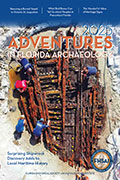We seldom think of our day=to=day activities as historic. Sure we live in historic times - the worst epidemic in 100 years, the political struggle for the nation’s soul - but what could be significant in which books we read, where we shop, what we drive?
Well, in 2018 a Florida Frontiers TV episode (https://myfloridahistory.org/frontiers/television/episode/31) featured the story of a man from a Jacksonville neighborhood who died in the First World War. There was an entire room at the Mandarin Museum filled with displays about this man, his family, his experience in the war and the belongings his unit sent back after his death.

Perhaps the most compelling item in the display was his unfinished cigar.
Not to encourage hoarding, but sometimes the everyday item, or photo, or diary entry can evoke a time, place, or person.

The same can be said for institutions and businesses. If they are successful, they will go on long enough to outlive the founders and someday, perhaps on an anniversary, someone in the marketing department or perhaps a volunteer looking for a project, will want to tell ‘our history’. If they are lucky, like Library of Florida History Archivist Ben Dibiase was when he wanted to tell the story of the Florida Historical Society (https://myfloridahistory.org/frontiers/radio/program/395) they will have some preserved items available. Of course, in this case, they had better.

Founding member George Rainsford Fairbanks (1820-1906) spelled it out in his first lecture in Jacksonville in 1857, over 150 years ago, to the new Historical Society of Florida as it was then called; the mission in part was to “Keep and preserve all that is known, in trust for those who come after us.” (http://www.floridahistorynetwork.com/feature---fernandinas-renaissance-man.html)
As the story went, it was a near thing. Historic times, such as the Civil War and Reconstruction took priority, but interested and dedicated individuals did not forget the mission. They collected books and papers on their own and in 1905 their perseverance paid off. Speaking of perseverance, again George Fairbanks was in the lead.

He rounded up some interested people in Jacksonville and drew up a charter with a new name but the same mission. We know, because they kept the original draft.

They also kept their state-of-the-art financial records which, frankly, might be a lot more archive quality than the computerized spreadsheets of today.

The same might be said for the membership records, which include the names of many Florida residents who helped make the history they wanted to preserve. Yes, the Helen DeLand on the top card is of that Deland family (https://www.perintonhistoricalsociety.org/history/people-of-perinton/helen-deland). If the name at the other end of the stack sounds familiar it is because you once read The Barefoot Mailman.
Flipping through the cards you will see names you recognize; Rawlings, Flagler, Collier, Putnam - even the names of seven former, serving or future Florida Governors.

In folders you will find charming examples of the day-to-day efforts of society officers and members to build and maintain relationships with the history community as well as hints at the growing professionalism and scholarly inclination of the society.


There is a binder with a formal letter from the Mayor of Miami and a slick marketing piece to entice the society to hold its 1953 annual meeting in the city.

Courtesy Florida Memory
The annual meetings, such as this 1961 dinner in St. Augustine with guest speaker Robert A. Gray, Florida’s Secretary of State (to right of standing speaker), evolved into three-day events with presentations by panels of scholars, tours of historic sites around the state and keynote talks by leading authors and academics.

As Archivist DiBiase covers in his presentation, the library has grown considerably from one small loaned room in a corner of the Jacksonville Library to a research facility with thousands of volumes, documents, maps, post cards and photographs in a repurposed post office in Cocoa Village (https://myfloridahistory.org/library).
The collection of documents on the Society itself has something of a hidden message, too. There is what can be charitably described as a paucity of photographs. You might have noticed even the photo of the 1961 dinner came from the state archives.
The hidden message is simple: grab a camera or your phone on ordinary days, document ordinary life as well as special occasions, print some of them on archive quality paper and keep them in a safe place for the future. Some day you, your place and your time will be history.







